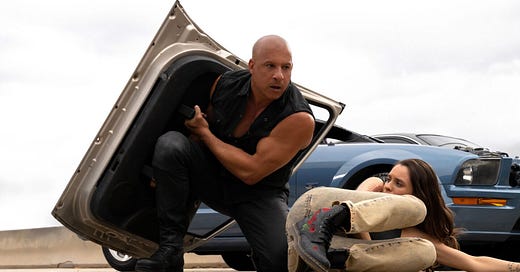These are not movies
'Fast X' and 'The Little Mermaid' are Hollywood's latest lifeless husks longing to be real films.
Universal’s “Fast X” and Disney’s “Little Mermaid” seem entirely different on paper, but in reality have quite a bit in common. Both try to capture the magic of better movies, but in doing so, merely repackage them for an audience they hope will look past their laziness.
In the case of “Fast X,” that better movie is “Fast Five,” arguably the best “Fast and Furious” movie. “Fast X” opens where “Fast Five” ended, re-editing the latter’s climactic and exhilarating action set piece to include Jason Momoa’s new “Fast X” villain. The movie is immediately asking its audience to remember when the franchise — which I have admittedly adored up to this point — was at its best. Echoes of this sentiment can be felt throughout the rest of the movie, in which action sequences feel all too familiar; the setting of that “Fast Five” set piece is even revisited in the movie’s present day for *another* action sequence.
The previous movie, “F9,” which I very much enjoyed, teetered on the edge of parody by purposely going as big as possible (after years of internet jokes, they do go to space). But “Fast X” is parody, even if those involved, particularly Vin Diesel, don’t realize it. Marvel’s “Thor: Love and Thunder” also fell into this trap last year; maybe once a franchise goes on for longer than it should, it’s hard not to.
Similarly, “The Little Mermaid” by design is a movie begging viewers to recall previous, better works — specifically, the heyday of Disney animation. Like Disney remakes before it, this movie repurposes the original 1989 animated classic into a faithful but boring “reimagining.” If I have to hear about “photorealism” for every one of these monstrosities, I’m going to barf. Star Halle Bailey does what she can with the material, but even her dynamic singing — which infuses the movie with some much-needed emotion during her rendition of the original’s classic songs — can’t save a movie that’s so content with being so dull. At nearly two-and-a-half hours, this is almost an hour longer than the original. Why? I’m not sure. It offers no discernible reason.
When a movie is so soulless — when it exists only for commercial gain and all ounce of creativity has seemingly been drained from its pores — can it even be considered a movie anymore?
This of course isn’t a new phenomenon in the Hollywood IP industrial complex. Earlier this year we suffered through “Ant-Man and the Wasp: Quantumania,” a paint-by-the-numbers Marvel entry that existed as no more than corporate obligation. “The Super Mario Bros. Movie” applies here to a lesser extent; it was fun enough as a competent kids movie — but it could also function as no more than a Nintendo ad.
But my exasperation feels especially acute now considering “Fast X” and “The Little Mermaid” were released on back-to-back weekends. They offer a haunting glimpse at the state of Hollywood franchise-driven movies as just products. Again, this isn’t a novel concept, but maybe it took these two movies in such close proximity to each other to break me.
Looking at the summer slate this year, we have the likes of “The Flash,” which is apparently actually good according to *checks notes* the studio releasing it (okay, and also critics who have seen it ahead of time). But even if it defies all obstacles and is as good as we’ve been led to believe, it will have done so largely on the back of Michael Keaton’s Batman, a product of a different superhero era forced into this current one of multiverses; it’s again begging the audience to care about this movie because it’ll remind you of those other movies.
Same for “Indiana Jones and the Dial of Destiny,” which hits theaters in late June, stars an 80-year old Harrison Ford, and features a story that appears to maybe be about time travel (and de-aging effects) — revisiting better movies and moments of Indy’s past. I wanted this movie to be good, but the reviews out of Cannes have been disappointing to say the least — another misguided attempt at capturing (i.e. bankrupting) nostalgia in the Disney era of Lucasfilm.
Of course, for every two mediocre cash grabs, Hollywood gives us one IP-driven tentpole that reminds us these movies can be good. “Guardians of the Galaxy Vol. 3” broke the recent Marvel curse by ignoring the multiverse and focusing on characters we’ve grown to adore, with some impressive filmmaking from James Gunn behind it (these movies can actually look good, too, and not just CGI garbage!). Before that, “John Wick: Chapter 4” was one of the best action films in recent memory, maybe since “Mad Max: Fury Road.” And I’m genuinely looking forward to “Mission: Impossible — Dead Reckoning” in July.
I’ll probably be right back to exclaiming “MOVIES ARE BACK” as soon as I witness something that exceeds expectations this summer and beyond. But for now, I’m feeling like a poor unfortunate soul.






